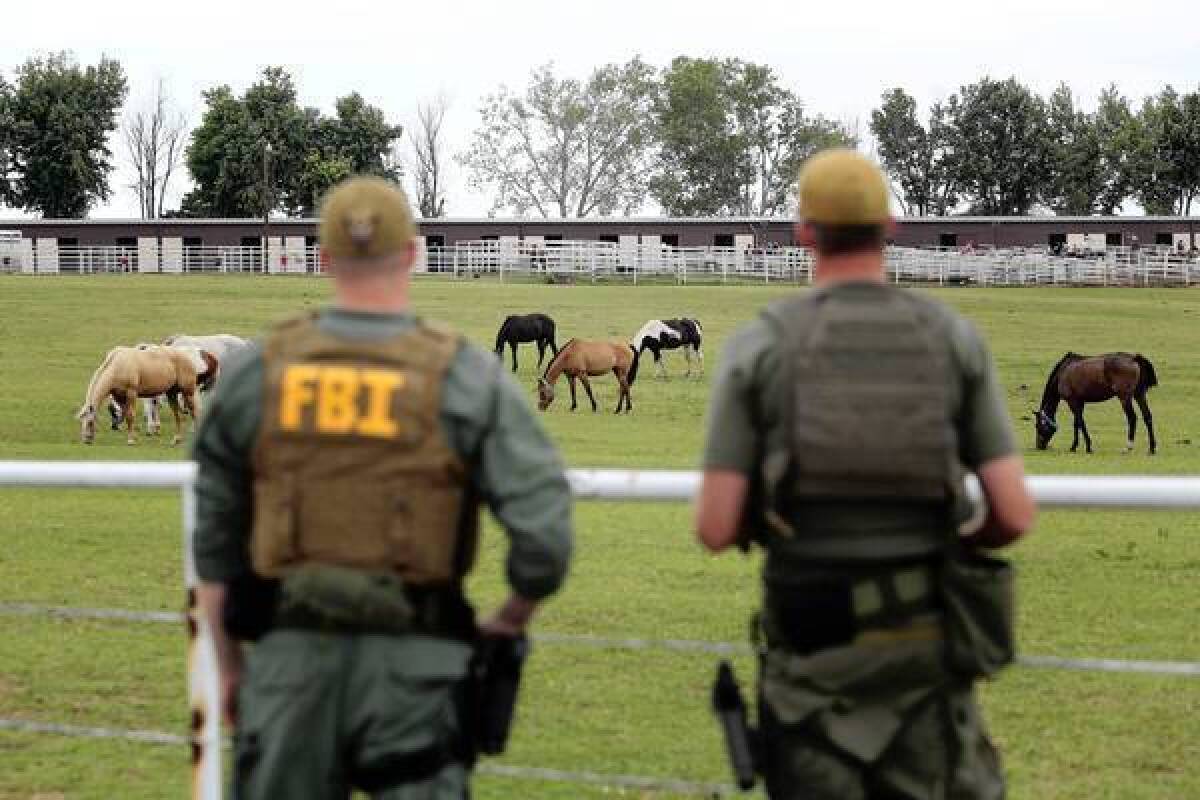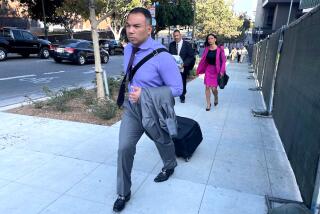Mexico cartel accused of laundering money at U.S. racetracks

WASHINGTON — The unlikely marriage of a violent Mexican drug cartel and the all-American world of U.S. quarter horses has apparently ended with the arrest of one of the top suspected members of the Zetas gang after an uncanny run of good fortune at the track raised suspicions.
Charged Tuesday in Austin, Texas, with using horses to launder millions of dollars in drug proceeds were Jose Treviño Morales, his wife and five associates. They were taken into U.S. custody after scores of FBI agents in all-terrain vehicles and helicopters raided stables and ranches near Ruidoso, N.M., and Lexington, Okla.
Working on a tip from more than two years ago, law enforcement officials learned that the Zetas were allegedly laundering up to $1 million a month in the high circles of American-bred quarter horses.
In a federal indictment returned May 30 and unsealed Tuesday in Texas, Treviño and the others were charged with laundering drug profits by “purchasing, training, breeding and racing American quarter horses.” An additional 11 suspects were being sought.
The two-state takedown marks the first known time that a cartel has allegedly used such a tactic — not only secreting its funds in a U.S. enterprise but investing in a storied U.S. tradition.
Part of the alleged scheme’s undoing was its success. Not only was it brazen — some of the horses had cartel names — but it attracted attention by winning races, including the granddaddy of quarter horse races, the All American Futurity, in 2010.
Robert Pitman, the U.S. attorney in West Texas, said the case showed “the corrupting influence of Mexican drug cartels within the United States.”
Richard Weber, chief of the Internal Revenue Service’s criminal investigation unit, called it a “prime example of the ability of Mexican drug cartels to establish footholds in legitimate U.S. industries.”
The case is all the more stark considering the long tradition of quarter horse racing, which dates from the American Colonial era. Quarter horses remain the most popular equine breed in the U.S.
News of the arrests was first reported by the New York Times, which said it had been investigating the alleged scheme for months and had agreed to withhold publication until charges were filed.
While Treviño and others were fielding winners at the track, the cartel was carrying out some of the most violent killings in Mexico. Last month, 49 dismembered bodies were discovered in bags there, and authorities saw it as the work of Treviño’s brother, Miguel Angel Treviño. He is the alleged No. 2 leader of the Zetas and one of the world’s most wanted narcotics-smuggling suspects. He is also one of those indicted and being sought in the horse racing case.
James Phelps, a border expert and assistant professor at Angelo State University in San Angelo, Texas, said horse racing would seem a perfect vehicle for hiding drug-smuggling profits.
“When you have hundreds of billions a year in your industry and you can’t ship the bulk of the cash back, it has to go somewhere,” he said. “They are buying huge ranches in locations across the Southwest and Mountain states. It’s just a very viable way to launder the cash.”
The Zetas is the largest drug cartel in Mexico, controlling 11 states there, authorities said. It funnels thousands of pounds of cocaine and other drugs to the U.S. each year, pocketing multimillion-dollar profits.
The indictment alleges that when those profits returned to the Zetas in Mexico in “bulk cash shipments,” they were delivered to “plaza bosses for counting and distribution.” To launder the profits, the cartel turned to “investments in racing quarter horses purchased via bulk currency payments, wire transfers, structured deposits and bulk currency deposits.”
Quarter horses generally are shown and raced in California and Southwestern border states. So it seemed a natural, officials said, especially as Zetas leaders using “Nextel push-to-talk phones, BlackBerries and UHF/VHF radio communications” could oversee the laundering operation safely from Mexico.
Jose Treviño, 45, and his wife, Zulema Treviño, 38, allegedly handled things on the U.S. side. Both were arrested at their Lexington ranch. The couple allegedly created several corporations — Tremor Enterprises, 66 Land and Zule Farms — to facilitate moving the money to the U.S. and sprinkling it around the track.
The indictment gave this play-by-play of their alleged activities:
In December 2008, Ramiro Villarreal purchased a quarter horse named Tempting Dash for $21,500. Ten months later, the horse won the Dash for Cash race at Lone Star Park in Grand Prairie, Texas. The horse was quickly transferred to Jose Treviño, who was off and running with the horse’s future winnings. Soon he deposited $435,000 into his Bank of America account.
He paid $875,000 for Dashin Follies in January 2010 and $250,000 for a quarter horse he named Corona Coronita Cartel. By September 2010, he and others had purchased 23 horses for $2.24 million. One horse, which was purchased for $280,000, was named Number One Cartel.
Their horsemanship paid off. In addition to winning the 2010 All American Futurity with Mr. Piloto in one of the largest upsets of its kind, they won the Texas Class Futurity with Tempting Dash in 2009.
Although the indictment does not say how U.S. authorities learned of the alleged scheme, the New York Times reported that Villarreal began cooperating with U.S. authorities when faced with possible prosecution. He turned up dead in his incinerated car near Nuevo Laredo, on the Mexican side of the border, in March 2011.
Those arrested Tuesday, and those who remain at large, face up to 20 years in prison if convicted, as well as fines and other damages of $20 million and more.
Times staff writer Molly Hennessy-Fiske in Houston contributed to this report.
More to Read
Start your day right
Sign up for Essential California for news, features and recommendations from the L.A. Times and beyond in your inbox six days a week.
You may occasionally receive promotional content from the Los Angeles Times.






